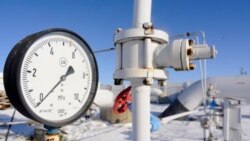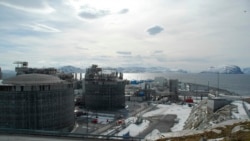Europe is being buffeted by unprecedented recovery-related energy price spikes, prompting rising alarm about whether families will be able to remain warm as the northern hemisphere's winter approaches.
Politicians are also anxious about the electoral repercussions and how spiking prices will fuel further inflation.
The price jumps in natural gas are due largely to a surge in demand in Asia and low supplies of in Europe, which has seen an astonishing 280% increase in wholesale gas prices. Electricity prices are also soaring because natural gas is used across the continent to generate a substantial percentage of its electricity.
Moscow's decision to refrain from boosting natural gas shipments via Ukrainian pipelines is worsening the crunch and adding to claims that Russia is using the energy needs of its European neighbors to hold them to ransom.
Some European politicians are accusing the Kremlin of deliberately worsening Europe's energy crisis as a tactic to pressure the European Union into speeding up certification of the just completed Nord Stream 2 gas pipeline, which bypasses Ukraine and runs from Russia to Germany under the Baltic Sea.
The International Energy Agency has called on Russia to boost gas exports. "The IEA believes that Russia could do more to increase gas availability to Europe and ensure storage is filled to adequate levels in preparation for the coming winter heating season," it said in a statement.
U.S. officials have also called on Moscow to increase gas exports. "The reality is there are pipelines with enough capacity through Ukraine to supply Europe. Russia has consistently said it has enough gas supply to be able to do so, so if that is true, then they should, and they should do it quickly through Ukraine," Amos Hochstein, senior adviser for energy security at the US Department of State, told Bloomberg TV this week.
Europe scrambles
Some members of the European Parliament want the European Commission to investigate Russia's majority state-owned energy company Gazprom. "We call on the European Commission to urgently open an investigation into possible deliberate market manipulation by Gazprom and potential violation of EU competition rules," a group of lawmakers said in a letter.
Moscow aside, Europe would still be faced with an energy price crunch, one that has raised the specter of factories and businesses having to reduce production and prompting warnings of food shortages.
In Britain, ministers have been holding emergency talks with industry representatives about surging wholesale gas and electricity prices, which have been blamed on higher global demand, maintenance issues and lower than expected solar and wind energy output.
Seven British natural gas suppliers have gone bust in the past six weeks, a consequence of wholesale gas prices surging by more than 70% in August alone. There are fears another three suppliers may declare bankruptcy. Suppliers are unable to pass on to customers the full increases because of government-imposed price caps on what consumers can be charged.
Nonetheless, British consumers will face price hikes this winter running into several hundreds of dollars per household. British officials are considering offering some of Britain's biggest energy retail companies state-backed loans to help them ride out the price tempest.
But there is a reluctance to use taxpayers' money, and midweek, Britain's business secretary, Kwasi Kwarteng, told a parliamentary panel that the energy industry must first "look to itself" for solutions.
Few observers believe Boris Johnson's ruling Conservative government will stay its hand. It has already intervened and extended emergency state support to avert a shortage of poultry and meat triggered by the soaring gas prices. This week ministers agreed to subsidize a major US company, CF Industries, paying it to reopen one of its two fertilizer plants in Britain which also produce as a byproduct carbon dioxide, vital for the country's food industry.
CF Industries closed both plants, which supply 60% of the CO2 needed to stun animals for slaughter and used to extend the shelf life of packaged fresh, chilled and baked goods. It is also used to produce carbonated drinks and to keep stored beer fresh. The closure of the plants prompted dire warnings from Britain's supermarkets of looming shortages.
Even with the emergency intervention running into hundreds of millions of dollars of public money, British ministers warned Wednesday that food producers need to prepare themselves for a 400% rise in carbon dioxide pricing.
State intervention
Other European governments are also considering how to intervene in energy markets to keep homes warm and lit, and factories running through the winter. They also fear domestic political fallout from sharp jumps in household costs and are considering billions of dollars in aid. EU energy ministers will meet this week to discuss national responses amid concerns that the energy crisis will severely disrupt the bloc's post-pandemic recovery.
In Spain and Portugal, average wholesale electricity prices are triple the level of half a year ago at $206 per megawatt-hour. Spain's government plans to cut taxes on utility bills.
Norway this week offered some relief by announcing that its state-owned energy company will boost the production of natural gas from two North Sea fields.
In Italy, ministers have warned of electricity prices jumping by 40% in the final quarter of 2021 and - like their southern European neighbors - are drafting emergency plans to soften the price blow for consumers. Some officials say $5.27 billion is being earmarked to support households with their costs, on top of a $1.17 billion the government has already spent to cushion consumers and businesses from the rising costs of energy imports. Italy imports two-thirds of its energy needs.
Last week, ecological transition minister Roberto Cingolani prompted an outcry from climate action groups when he said carbon taxes have contributed to the higher energy costs for households and businesses. Carbon pricing and taxes are employed to try to dis-incentivize the use of fossil fuels. Faced with rising criticism, Cingolani later stressed the need to "accelerate with the installation of renewables, so that we unhook ourselves as soon as possible from the cost of gas."
Information from Reuters and Ansa was used in this report









